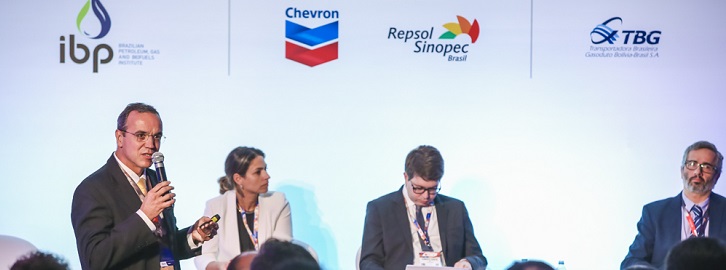At Rio Oil & Gas, Ministry of Mines & Energy advocates the continuance of regulatory stability

ANP further leverages investment in mature fields
Rio de Janeiro, September 25 – The secretary of oil, natural gas and biofuels of the Ministry of Mines & Energy, João Vicente Vieira, said in Rio de Janeiro on Tuesday that the federal government’s dialogue with the oil industry has brought many benefits to Brazil and expects the next administration to continue the progress of the regulatory agenda.
Vieira warned that regulatory stability is key to ensure the attraction of investments to the industry, which “will always seek the best place to invest. If we do not have regulatory stability, they will take that investment somewhere else”, he said.
He mentioned that the change from the concession regime to the sharing regime, for example, caused significant losses to the country. “If we had not changed the framework, we would probably be producing 2 billion barrels per year, or 5 million barrels per day.”
Regarding environmental licensing, the secretary defended the need for simplification and predictability of the process, an opinion shared also with BP’s Vice President and Legal Officer Humberto Quintas and Repsol Sinopec Legal Director, Pablo Gay-Ger, who also attended the event.
ANP encourages investments in mature fields
The director of the National Petroleum Agency (ANP), Décio Odonne, said that the current resumption of the industry relied on the development of the subsalt play. However, he believes that onshore areas should also receive investments. To attract companies to such areas, the agency has reduced royalties on mature fields and initiated the permanent offer of blocks. “We need a diversity of players”, Odonne said.
The president of the Brazilian Institute of Petroleum, Gas and Biofuels (IBP), José Firmo, said that the sector is looking for this diversification and that the current recovery will escalate in the coming years, with new jobs and investments. One of the recent initiatives of the IBP in this sense was the creation of the onshore committee.
According to Sérgio Rial, president of Santander Brasil, there are funds available to finance projects in the sector in this recovery stage, including for independent medium-sized companies. “There are funds available for Infrastructure, especially in the oil & gas industry, which are likely to create opportunities with the sale of Petrobras assets”, said Rial.
Funds allocated in R&D
In the schedule of side events on the second day of Rio Oil & Gas, the subject “Funds Allocated in Research and Development – Results and Outlooks” discussed possible adjustments that ANP is preparing to the current R&D regulation. Oil & gas companies, such as Petrobras – which participated in the debate – call for the flexibility and simplification of rules for a larger share of investments in that area.
“R&D investments are expected to increase in the coming years, generating the research required for the industry to move forward, facilitating investments in innovation, streamlining processes and leveraging our industry”, said Alfredo Renault, ANP’s superintendent of Research & Development.
According to Paulo Roberto Barreiros Neves, manager of the Leopoldo Américo Miguez de Mello Research Center (Cenpes), Petrobras has always employed R&D resources, which has generated around 1,000 projects in its research center. “Our focus is to develop technologies in order to lower production costs and, in the future, incorporate startups projects, expanding the company’s portfolio of digital technologies and streamlining processes”, he said.
The Renovabio Challenge
The long road to the consolidation of Renovabio and obstacles to be overcome were a topic for discussion on the second day of Rio Oil & Gas. The technical director of UNICA (Union of the Brazilian sugar cane industry), Antonio de Padua Rodrigues, recalled that it is crucial to have na environment of predictability, credibility and profitability in Brazil. “These are the three cornerstones that will lead Renovabio to success, bringing safety to consumers.”
Padua admitted, however, that there are challenges for ethanol producers, such as optimizing processes and increasing the efficiency of production. But he stressed that public players also need to conclude the regulation effectively and with the lowest transition cost to society.
For Petrobras’ executive marketing manager, Guilherme Pontes Galvão França, it is necessary to align Renovabio with other government programs such as Combustivel Brazil so that the program can move forward.
In the view of the executive president of Plural, Leonardo Gadotti, it is important to analyze regulatory and tax issues so that there is an environment of greater legal certainty in the country that can leverage Renovabio. In addition to regulatory improvements and a better competitive environment, he calls for investments in infrastructure, such as an increased production capacity and building new pipelines.
Decommissioning Forum
The issue of decommissioning was also discussed on the second day of Rio Oil & Gas, in one of the side events of the program. According to Eduardo Zacaron, Petrobras’ E&P decommissioning manager, although decommissioning is a natural production activity, there is a need to adapt methodologies to Brazilian specificities.
“We see the regulatory issue in progress, especially with the participation of ANP and IBAMA, but it is necessary to bring regulators, the academia and the industry closer so that solutions are built in a way to maximize results”, he said.
Political background – Twelve days before the first round of the presidential elections, Rio Oil & Gas 2018 received, during this Tuesday’s luncheon, the journalist Gerson Camarotti, a political commentator of GloboNews and a columnist of G1, to draw up an analysis of the the country’s political and economic scenario.
The complete schedule can be accessed in the www.riooilgas.com.br portal or in the App, available for download on Google Play or the App Store.